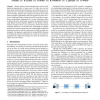Free Online Productivity Tools
i2Speak
i2Symbol
i2OCR
iTex2Img
iWeb2Print
iWeb2Shot
i2Type
iPdf2Split
iPdf2Merge
i2Bopomofo
i2Arabic
i2Style
i2Image
i2PDF
iLatex2Rtf
Sci2ools
121
click to vote
ECAI
2008
Springer
2008
Springer
A BDD Approach to the Feature Subscription Problem
Modern feature-rich telecommunications services offer significant opportunities to human users. To make these services more usable, facilitating personalisation is very important since it enhances the users' experience considerably. However, regardless how service providers organise their catalogues of features, they cannot achieve complete configurability due to the existence of feature interactions. Distributed Feature Composition (DFC) provides a comprehensive methodology, underpinned by a formal architecture model to address this issue. In this paper we present an approach based on using Binary Decision Diagrams (BDD) to find optimal reconfigurations of features when a user's preferences violate the technical constraints defined by a set of DFC rules. In particular, we propose hybridizing constraint programming and standard BDD compilation techniques in order to scale the construction of a BDD for larger size catalogues. Our approach outperforms the standard BDD technique...
Artificial Intelligence | ECAI 2008 | Standard Bdd | Standard Bdd Compilation | Standard Bdd Techniques |
Related Content
| Added | 19 Oct 2010 |
| Updated | 19 Oct 2010 |
| Type | Conference |
| Year | 2008 |
| Where | ECAI |
| Authors | Tarik Hadzic, David Lesaint, Deepak Mehta, Barry O'Sullivan, Luis Quesada, Nic Wilson |
Comments (0)

